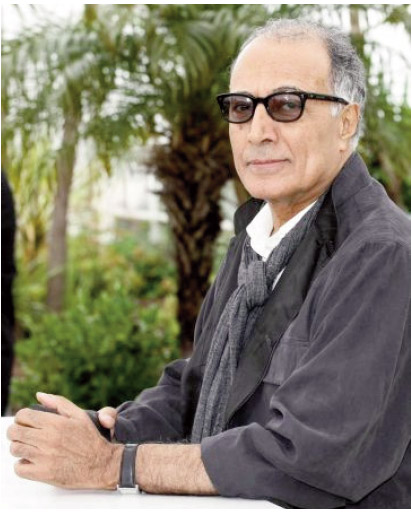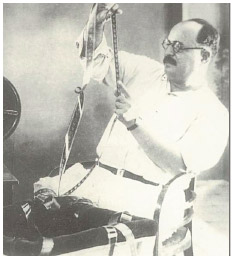How India lost them !
Gautam Kaul
 Abbas Kariostam
During the first week of July as
the people of USA marked their
day of independence and
freedom from colonial rule, a
venerated old gentleman of
cinema across the Atlantic
died. He had moved out of his own country
because his State did not permit him the
freedom of expression and speech.
Abbas Kariostam
During the first week of July as
the people of USA marked their
day of independence and
freedom from colonial rule, a
venerated old gentleman of
cinema across the Atlantic
died. He had moved out of his own country
because his State did not permit him the
freedom of expression and speech.
That gentleman, Abbas Kariostami, hailed
from Iran and had placed his country on the
map of international cinema with a set of
films espousing the cause of individual
freedom. This was forbidden activity in his
homeland and Karlostami had to move out to
Paris(France) to have the freedom to make
films the way he desired.
Despite the fact we Indians tom-tom the
idea of freedom of expression, journalists
and documentary film makers find their
personal liberty and rights stifled by the
Indian State. Stringent laws from the
Imperial days are clamped down to stop the
spread of inconvenient information. Sadly
enough, the feature film makers also get a
taste of the Censor’s wrath though not for any
expression of individual rights but for
excessive show of sex, violence and bad
language, totally unfit for human
consumption.
India is, therefore, not a natural choice for
asylum by those who want to live breathe the
fresh air of freedom. India is an untested
territory for seekers of freedom by men of
cinema and Abbas Kariostami would not have
survived here. One can ask Anand
Patwardhan about his views on the air of
freedom in India. He is a star maker of
feature documentaries about the causes he
espouses but always finds himself in assured
trouble over his latest production.
The late Khwaja Ahmad Abbas also had to
plead his case before the highest court in the
land to assert his right for freedom to exhibit
his unbiased documentary films denied clearance by the State. The laws of film censorship have not
provided assurance of a better future for the film makers and
scribes.
The enlarged draft of the Cinematograph Act of 2013 and the
latest shenanigans attached to the Shyam Benegal Committee
to review the functioning of the Board of Film Certifications
show that the State has not been able to come to grips with the
need of the national film industry to fare better.
The entertainment industry in India is arguably the only
industry to have grown without state assistance from the very
beginning. If anything at all has been done, the ‘traders’ in this
industry find themselves out of favour with the State more
often than not. They have had to seek outside support. The
State has continued to use the industry for its own vested
interest in moulding the psyche of the viewing masses.
 Sergei Eisenstein
Sergei Eisenstein and Charles Chaplin shared the dubious
distinction of being damned and banned in India during the first half of the 20th century of the
Imperial era, during which they
were considered a threat to the
Indian State.
Even free India did not allow
freedom fighters to use cinema to
present their case before India’s
intelligentsia and were kept out at sea.
Sergei Eisenstein
Sergei Eisenstein and Charles Chaplin shared the dubious
distinction of being damned and banned in India during the first half of the 20th century of the
Imperial era, during which they
were considered a threat to the
Indian State.
Even free India did not allow
freedom fighters to use cinema to
present their case before India’s
intelligentsia and were kept out at sea.
For an alien to be accepted
from the world of cinema and
feel free, one has to be a
Pakistani or an Afghani to stand
the test. Salma Agha and Adnam
Sami found success using the law
of Indian inheritance to their
benefit. We are happy for them
that have returned to the land of
their ancestors.
 Charles Chaplin
Half a century ago, the American
press ran a clever promotion: ‘Time
is for those who can read and Life
is for those who can see’. That
partly explained the power of both
print and pictures. Life magazine
sold more copies during the period
of the Second World War as its staff
covered the war front eloquently
with daring pictures. Time took
over the minds of its readers when
it was necessary to explain at
length what the War was actually
being fought for. A whole world
was struck dumb when a holocaust
was perpetuated in Europe.
Charles Chaplin
Half a century ago, the American
press ran a clever promotion: ‘Time
is for those who can read and Life
is for those who can see’. That
partly explained the power of both
print and pictures. Life magazine
sold more copies during the period
of the Second World War as its staff
covered the war front eloquently
with daring pictures. Time took
over the minds of its readers when
it was necessary to explain at
length what the War was actually
being fought for. A whole world
was struck dumb when a holocaust
was perpetuated in Europe.
 Salma Agha and Adnam Sami
The State fears cinema for its
instant impact. It takes time for
words of free expression to move
from the printer to the hands of the
reader. Cinema is comprehensible
even to the illiterate. All States with
devious intentions of dictatorship
rule either under the cover of
democracy or just plain truth by
usurping the authority to control
the media – first the cinema, and
the press with its hacks there after.
Salma Agha and Adnam Sami
The State fears cinema for its
instant impact. It takes time for
words of free expression to move
from the printer to the hands of the
reader. Cinema is comprehensible
even to the illiterate. All States with
devious intentions of dictatorship
rule either under the cover of
democracy or just plain truth by
usurping the authority to control
the media – first the cinema, and
the press with its hacks there after.
An alternate litmus test exists in
the public domain, for finding out
how that particular State governs
the land in context of its people
and their right to information via
its cinema, provided there is a
strong film industry in the region.
There is a sad irony in the turn of
events.
It was an Indian, in India,
who created the Iranian film industry. Ardeshir Irani made
the first eleven films in the
Persian language while he lived
in India but created an ethnic
audience in Iran to enjoy their
own language cinema. He was a
genius, knowledgeable in Hindi,
Urdu, Persian, English, German,
Gujarati, Marathi and Sinhalese.
The fact that that he was the
father of Iranian Cinema is least
asserted in Iran and India.
 Ardeshir Irani
Iranian film makers should have
found India as a convenient
country to move their base and
continue to ply their trade. The fact
is that we do not yet welcome films
from Iran into our theatres despite
the fact that many films made in
Iran or by Iranians elsewhere are
high quality entertainment, even if
not on an epic scale.
Ardeshir Irani
Iranian film makers should have
found India as a convenient
country to move their base and
continue to ply their trade. The fact
is that we do not yet welcome films
from Iran into our theatres despite
the fact that many films made in
Iran or by Iranians elsewhere are
high quality entertainment, even if
not on an epic scale.
Presently there is no strong
contact in both trade and culture
between the two nations. We
humour Iran for its petroleum and
not because our Hindustani
culture has roots from the area
called Faras, Persia or Iran.
The
people of present day Iran gave our
subcontinent its first identity 4000
years ago and call its people
Hindus. They had in mind the
Hindukush mountains and the river
Sindhu.
Contributed by a veteran
National awardee on Cinema,
and film jurist



